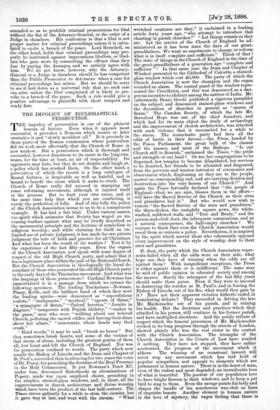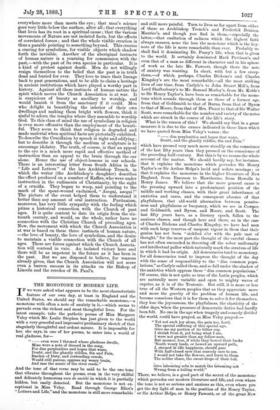THE IMPOLICY OF ECCLESIASTICAL PERSECUTION.
impolicy of persecution is one of the plainest 1 lessons of history. Even when it appears most successful, it provokes a Nemesis which sooner or later overtakes it and "slowly moulders all." It is precisely in those parts of the Roman communion where persecution did its work most effectually that the Church of Rome is now weakest. But a persecution which is thorough and successful, however disastrous to its cause in the long-run, wears, for the time at least, an air of respectability. Its opponents may hate, but they do not despise and laugh at, a policy which has crushed them. On the other hand, a persecution of which the record is a long catalogue of dismal failures, is despicable as well as hateful, and is bound to benefit the cause which it seeks to crush. The Church of Rome really did succeed in stamping out some reforming movements, although it injured itself in the process. But to hurt your own cause, and at the same time help that which you are combating, is surely the perfection of folly. And of this folly the policy of the Church Association seems to us to be a conspicuous example. It has had a fair trial. Under various names, tha spirit which animates that Society has waged an un- ceasing warfare against what may be briefly described as the sacramental principle and the doctrine of symbolism in religious worship ; and while claiming for itself an un- limited use of private judgment, it has made its own private judgment the rule of faith and practice for all Christians. And what has been the result of its warfare ? Test it by the experience of the last fifty years. Even the organs of the Church Association now speak with some degree of respect of the old High Church party, and admit that it has a legitimate place within the pale of the National Church. But the Church Association is theologically the lineal de- scendant of those who persecuted the old High Church party in the early days of the Tractarian movement. And what was the language of those persecutors ? Cardinal Newman has immortalised it in a passage from which we extract the following specimen. The leading Tractarians—Newman, Pusey, Keble, and the brilliant band of which they were the leading spirits—were denounced as " superstitious zealots," " malignants," " mystical," " agents of Satan," " a synagogue of Satan," " Oxford heretics," " Jesuits in disguise," " tamperers with Popish idolatry," "• snakes in the grass," men who were " vrallzinE,, about our beloved Church, polluting the sacred edifice, and leaving their slime about her altars," " miscreants, whose heads may God crush."
" Hard words," it may be said, " break no bones." But they sometimes break hearts, and some of the victims of that storm of abuse, including the greatest genius of them all, lost heart and left the Church of England. Nor was the persecution confined to words. The party which now assails the Bishop of Lincoln and the Dean and Chapter of St. Paul's, succeeded then in silencing for two years the voice of Dr. Pusey, for preaching the doctrine of the Real Presence in the Holy Communion. It put Newman's Tract %C. under ban, denounced Sisterhoods as abominations of Popery, made war upon surpliced choirs, preaching in the surplice, stained-glass windows, and, in short, all the improvements in church architecture and divine worship which have been the product of the last half-century. The Times strove gallantly for a while to stem the current, but it gave way at last, and went with the stream. " What wretched creatures are they," it exclaimed in a leading article forty years ago, " who attempt to introduce that chanting in parish churches !" " Let things remain as they are. Let the service of the Church of England be ad- ministered as it has been since the days of our great- grandfathers. We want no enactments to change or reform what is in itself complete and sufficient." Think of that ! The state of things in the Church of England in the time of the great-grandfathers of a generation ago " complete and sufficient ' ! In that same year the Dean and Chapter of Windsor presented. to the Cathedral of Calcutta a stained- glass window which cost .25,000. The party of which the Church Association is now the champion and the organ sounded an alarm. The central panel of the window repre- sented the Crucifixion, and this was denounced as a dan- gerous incentive to idolatry among the natives of India. Mr. (afterwards Dean) Goode published a vigorous pamphlet on the subject, and denounced stained-glass windows and the decoration of churches in general as " snares of Satan." The Camden Society, of which the late Mr. Beresford Hope was one of the chief founders, and which had for its main object the study of archaeology and the improvement of church architecture, was attacked with such violence that it succumbed for a while to the storm. The iconoclastic party had then all the odds of battle in their favour,—the. Press, headed by the Times, Parliament, the great bulk of the classes and the masses, and most of the Bishops. " Is our Church still to flourish," exclaimed the Times, " the pride and strength of our land ? Or are her congregations to be dispersed, her temples to become dilapidated, her services to be deserted, her friends to be alienated and disgusted, from the perverse and wanton intrusion of ceremonies and observances which, displeasing as they are to the people, answer no corresponding end, and are carrying division and destruction into the very bosom of our Church ?" And again the Times fervently declared that " the people of England—God, we are sure, blesses them in the effort— will have the Sacred Service of the Church as their sires and grandsires had it." But who would now wish to restore " the Sacred Service of the sires and grandsires," the three-decker, the unsightly square pews, the white- washed, mildewed walls, and " Tate and Brady," and the parson-and-clerk duet, the infrequent communions, and as a natural consequence, the half-empty churches ? We venture to think that even the Church Association would recoil from so ruinous a policy. Nevertheless, it is inspired by the spirit which moved those who vehemently opposed every improvement on the style of worship dear to their sires and grandsires.
If, then, the party which the Church Association repre- sents failed when all the odds were on their side, what hope can they have of winning when the odds are all against them ? With insignificant exceptions, the Press is either against them or is indifferent. The same may be said of public opinion in educated society and among the masses. Surely the retrospect of the last fifty- years should make them pause. Even if they were to succeed in destroying the reredos at St. Paul's, and in forcing the Bishop of Lincoln out of his See, what would they gain by it ? Have not their apparent victories hitherto ended in humiliating defeats ? They succeeded in driving the late Mr. Mackonochie out of his parish, and in ruining his health. But the doctrines and practices which they attacked in his person still continue in his former parish, and have multiplied elsewhere. And the public tribute of respect which the funeral procession of Mr. Mackonochie evoked in its long progress through the streets of London, showed plainly who was the real victor in the contest with the Church Association. The triumphs of the Church Association in the Courts of Law have availed it nothing. They have not stopped, they have rather accelerated, the progress of the movement which it abhors. The winning of an occasional lawsuit will never stop any movement which has laid hold of popular sympathies, and appeals to elements which are permanent in human nature. There is in the heart of man, even of the rudest and most degraded, an ineradicable love of what is beautiful. The poorest of our population love to have bright flowers in their windows, and to keep a pet bird to sing to them. Even the savage paints his body and shapes the handle of his murderous war-club on lines of exquisite beauty. Another element in human nature is the love of mystery, the vague feeling that there is everywhere more than meets the eye ; that man's science goes very little below the surface, after all ; that everything that lives has its root in a spiritual cause ; that the various movements of Nature are not isolated facts, but the effects of correlated forces ; and that the whole visible creation is thus a parable pointing to something beyond. This creates a craving for symbolism, for visible objects which shadow forth the invisible. Another of the aboriginal instincts of human nature is a yearning for communion with the past,—with the past of its own species in particular. It is a kind of protest against death. Men do not willingly resign themselves to the belief that the past is in truth dead and buried for ever. They love to trace their lineage back to past generations, and to be able to claim a heritage in ancient institutions which have played a worthy part in history. Against all these instincts of human nature the spirit which moves the Church Association is at war. It is suspicious of beauty as ancillary to worship, and would banish it from the sanctuary if it could. Men who delight in beautifying the interior of their own dwellings and making them bright with flowers, think it sinful to adorn the temples where they assemble to worship God. To this class of mind the use of symbolism in religion is even more offensive than the employment of the beauti- ful. They seem to think that religion is degraded and made material when spiritual facts are pictorially exhibited. To describe the Crucifixion by speech is right and edifying ; but to describe it through the medium of sculpture is to encourage idolatry. The truth, of course, is that an appeal to the eye is a much more rapid and effective method of instruction than an appeal to the brain through the ear alone. Hence the use of object-lessons in our schools. There is an interesting letter from South Africa in the " Life and Letters " of the late Archbishop Trench, in which the writer (the Archbishop's daughter) describes the effect produced on a number of Kaffirs, who were under instruction in the rudiments of Christianity, by the sight of a crucifix. They began to weep, and pointing to the mark of the spear-wound exclaimed, " Asegai, asegai !" The picture of the event helped them to understand it better than any amount of oral instruction. Puritanism, moreover, has very little sympathy with the feeling which prizes a historical connection with the Church of past ages. It is quite content to date its origin from the six- teenth century, and would, on the whole, rather have no connection with the Christian Church of preceding ages. Now, the movement with which the Church Association is at war is based on these three instincts of human nature, —the love of beauty, the love of symbolism, and the desire to maintain a visible connection with the Church of all ages. These are forces against which the Church Associa- tion will contend in vain. An isolated victory here and there will be as impotent in the future as it has been in the past. But we are disposed to believe, for reasons already given, that the Church Association will not score even a barren success in its attacks on the Bishop of Lincoln and the reredos of St. Paul's.



































 Previous page
Previous page